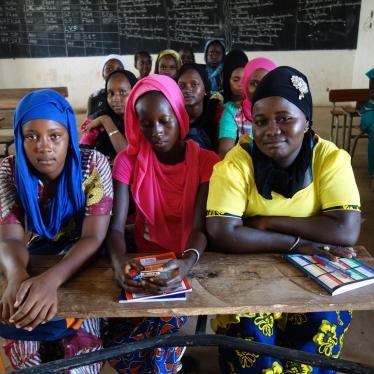(New York) - The global spread and rampant misuse of small arms and light weapons requires a reinvigorated international response, Human Rights Watch said today. More than 100 governments will gather in New York July 7-11 to assess progress in stemming the trade in small arms since a U.N. Program of Action was agreed two years ago.
“Governments have a long way to go to address the scourge of small arms,” said Lisa Misol, arms trade researcher with Human Rights Watch. “They should start by cleaning up their own behavior.”
Civilians around the world are at the mercy of small arms-wielding abusers, including those of rebel forces and government armies.
In a new briefing paper released today, Human Rights Watch documented numerous recent examples of small arms abuses:
- Small arms have been misused by governments and rebel forces in Burma, Colombia, Côte d’Ivoire, Democratic Republic of Congo, Liberia, Macedonia, and Nepal, and in fighting in Israel and the Occupied Territories.
- In post-conflict Afghanistan and Iraq, the widespread availability of small arms has threatened security, undermined the rule of law, harmed peace-building efforts, and put civilians in grave danger.
- Small arms also are used to carry out abuses in countries not affected by war - such as Cambodia, Guatemala, Kyrgyzstan, Nigeria, and Serbia.
The U.N. Program of Action focuses on preventing illicit trafficking in small arms. It does not deal with misuse and only addresses government responsibility in relation to preventing the illegal arms trade.
The U.N. process has helped bring attention to the global problem of small arms and led to progress in some areas, Human Rights Watch noted, but further work is needed.
“This human rights crisis demands a human rights response,” Misol said.
Human Rights Watch called on governments to prevent and punish small arms misuse, both by government agents and private actors. Governments also should cease authorized arms transfers to abusers and tighten controls to prevent and punish illicit arms trafficking and irresponsible internal weapons circulation.
Key elements of a human rights-centered approach to small arms include government action to:
- Fulfill existing government responsibilities to comply with international humanitarian and human rights law, and ensure that police and armed forces strictly uphold international standards.
- Ensure adequate laws are in place to punish the misuse of small arms by private actors, and that these are effectively implemented and enforced.
- Stop authorizing “legal” arms transfers to abusive recipients and adopt binding instruments on arms transfers that contain strong human rights and humanitarian criteria, such as the proposed international Arms Trade Treaty.
- Close legal loopholes and strengthen lax controls that allow gray market trade in weapons to thrive and hold arms traffickers accountable, including by negotiating binding international treaties on arms brokering and marking and tracing.






